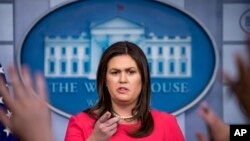The United States has said it will take further action against the government of Cambodia following a landslide victory for the ruling party in a general election on Sunday.
In a statement on Monday, the White House said it regretted the way the election was organized which it said was “neither free nor fair and failed to represent the will of the Cambodian people.”
Prime Minister Hun Sen has come under fire from the international community for arresting the leader of the country’s main opposition party, the Cambodia National Rescue Party, overseeing the CNRP’s dissolution, and for a widespread crackdown on political freedoms in the run up to the election.
The U.S. was joined in its condemnation of the election process by several governments, political figures and rights groups.
“The flawed elections, which excluded the country’s principal opposition party, represent the most significant setback yet to the democratic system enshrined in Cambodia’s constitution, and substantially erode Cambodia’s achievements in promoting political reconciliation and economic growth since the 1991 Paris Peace Agreement,” the White House statement reads.
“The United States will consider additional steps to respond to the elections and other recent setbacks to democracy and human rights in Cambodia, including a significant expansion of the visa restrictions announced on December 6, 2017.”
In December, the U.S. placed visa restrictions on several senior figures in the ruling party and security forces. The move was followed by the passing of the Cambodia Democracy Act last week, which places wider sanctions on Hun Sen’s inner circle.
The White House on Monday repeated calls for the Cambodian government “to take tangible actions to promote national reconciliation by allowing independent media and civil society organizations to fulfill their vital roles unhindered, immediately releasing Kem Sokha and other political prisoners, and ending the ban on the political opposition.”
Phay Siphan, government spokesman, rejected the White House statement, saying it “did not reflect the Cambodian reality”.
“I see the statement is opposing 86 or 87 percent of Cambodian voters who want to decide the fate of their country,,” he said, in reference to the reported voter turnout figures on Sunday.
“The people clearly understand how to decide their country’s fate and how to strengthen the democratic process,” he added.
The CNRP led a boycott prior to the election, but a campaign of threats and intimidation by the CPP appear to have pushed many opposition supporters to the polling booth, although reported instances of spoiled ballots were significantly higher than in previous elections.
The U.S., E.U. and Japan declined to send observers to monitor the vote in a break with protocol, with the Cambodian government relying on tens of thousands of pro-CPP observers and a small coterie of observers from mostly non-democratic states and populist foreign political parties.
In another statement, the E.U. said the “lack of genuine electoral competition and the absence of an inclusive political process mean that the 29 July election is not representative of the democratic will of the Cambodian electorate and therefore its outcome lacks credibility.”
“The European Union expects the Cambodian authorities to restore democracy, to engage in dialogue with the opposition, and to create conditions conducive to free political debate and competition, in which the media and civil society, including human rights and labor rights defenders, can freely exercise their rights without undue restrictions,” it added.
Separately, Australia said it had “serious concerns” over how the election had been conducted and was “disappointed that Cambodian people have been unable to choose their representatives.” Meanwhile, the Canadian government said it was a “long-time friend of Cambodia” and would “continue to use every opportunity to promote freedom of expression and political participation”.
Charles Santiago, a Malaysian MP who chairs Asean Parliamentarians for Human Rights, said the election was “a dark day in Cambodia’s history.”
“Millions of Cambodians were denied a genuine choice as the CPP’s victory was guaranteed even before the first ballot was cast. The year leading up to the vote was marked by a widespread crackdown on critics, and we saw these same tactics on voting day as several independent news sites were blocked,” he said.
“Hun Sen has clearly been engaged in a desperate bid to try to legitimize these elections, including by shipping in international observers with questionable democratic credentials, and by threatening people to vote. But nothing can take away from the fact that this was a sham election.”








